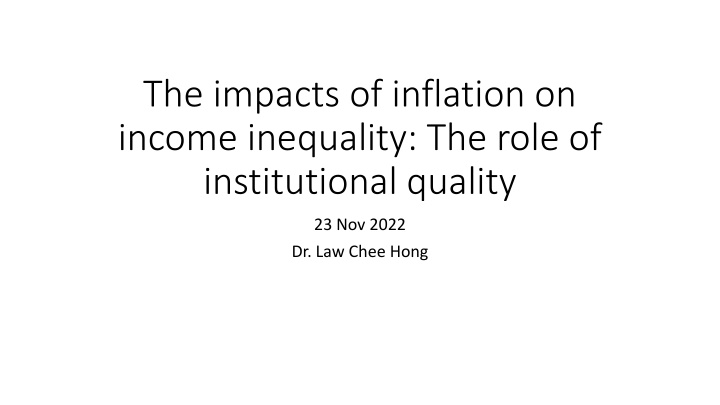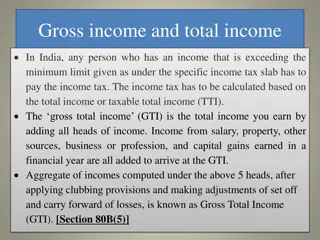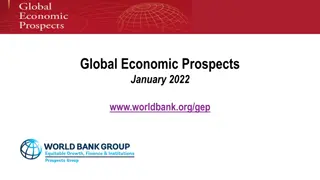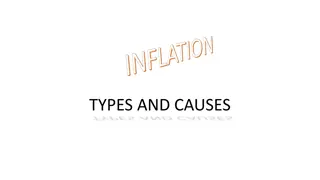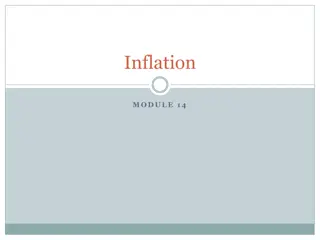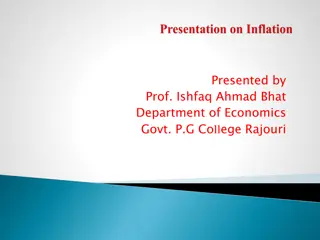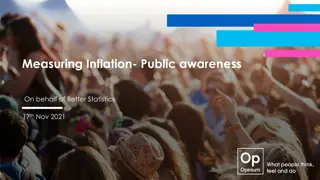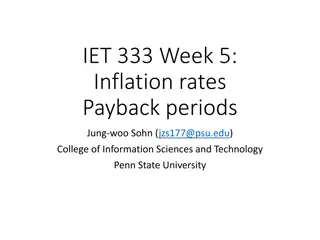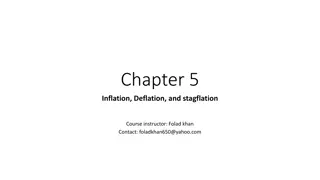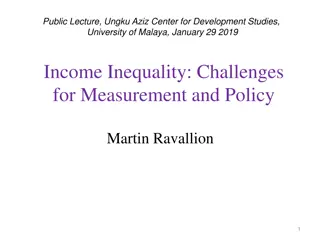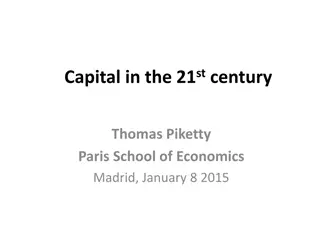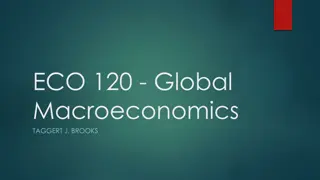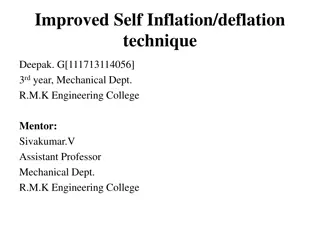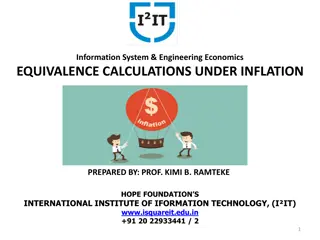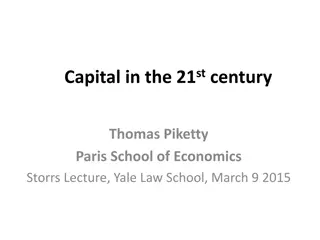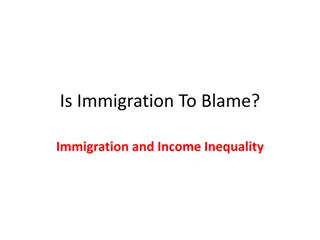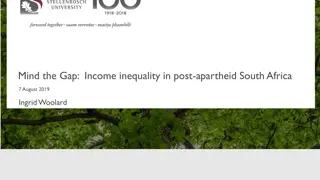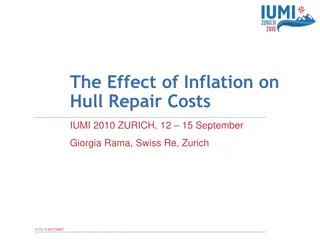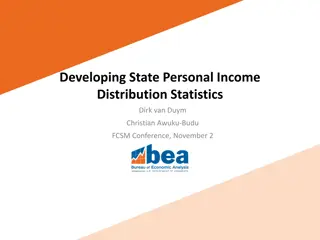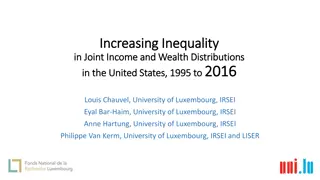Impact of Inflation on Income Inequality: Role of Institutional Quality
Income inequality is a key economic and social issue, influenced by factors such as economic development, monetary policy, and inflation rate. This study delves into the relationship between inflation and income inequality, with a focus on the role of institutional quality in shaping this dynamic.
Download Presentation

Please find below an Image/Link to download the presentation.
The content on the website is provided AS IS for your information and personal use only. It may not be sold, licensed, or shared on other websites without obtaining consent from the author.If you encounter any issues during the download, it is possible that the publisher has removed the file from their server.
You are allowed to download the files provided on this website for personal or commercial use, subject to the condition that they are used lawfully. All files are the property of their respective owners.
The content on the website is provided AS IS for your information and personal use only. It may not be sold, licensed, or shared on other websites without obtaining consent from the author.
E N D
Presentation Transcript
The impacts of inflation on income inequality: The role of institutional quality 23 Nov 2022 Dr. Law Chee Hong
Income inequality in 2019 Income inequality in 2019 Source: https://ourworldindata.org/income-inequality
Introduction The income inequality has numerous economic and social effects. Among the determinants of income inequality investigated in the previous studies are: 1) Economic development level (Monnin, 2014). 2) Unemployment (Monnin, 2014). 3) Institutional factors (Amendola, Easaw & Savoia, 2013) 4) Monetary policy (interest rate) (Colciago et al. 2019). 5) Inflation rate (Colciago et al. 2019).
Introduction The focus of the paper is inflation Previous studies such as Monnin (2014), Narob (2015), Balcilar, Chang, Gupta, and Miller (2018), Siami-Namini and Hudson (2019) has find either linear or nonlinear impacts of inflation. Theoretical impacts of inflation on income inequality 1) Increase income inequality by lower purchasing power of the poor and real value of government aids (regressive tax). 2) Reduce income inequality by inflating nominal income and lead to higher income tax (progressive tax)
Introduction The objectives of the paper are: 1) To study the inflation-income inequality nexus using panel data. 2) The role of institutional quality in that nexus. Rationale of the second objective: 1) Better institutional quality will tend to offer inclusive economic planning and promote a more equal income distribution 2) According to Law, Tan and Azman-Saini (2014), the poor are more protected in a well-design institutional framework.
Methodology and Data Uses the two-step System GMM estimator to tackle the effect persistency. Deploys an unbalanced panel set (4-year non-overlapping average data from 1987 to 2014) from 65 developed and developing countries. Note 1: orthogonise the interaction term to avoid strong correlations between interaction term and its components. This is done by regressing interaction term on LINS and INF_CPI. The residual will be used for estimation. Note 2: Outliers are identified by using the Cook s distance outlier test and excluded from the test.
Methodology and Data Algeria Chile Germany Israel Netherlands Singapore Uganda Argentina China Ghana Italy New Zealand South Africa United Kingdom Australia Colombia Greece Japan Niger Spain United States Austria Costa Rica Honduras Jordan Norway Sri Lanka Uruguay Bangladesh Cyprus Hong Kong, China Korea, Rep. Pakistan Sweden Zambia Belgium Denmark Hungary Luxembourg Peru Switzerland Bolivia Egypt, Arab Rep. Iceland Malawi Philippines Tanzania Brazil Finland India Malaysia Portugal Thailand Cameroon France Indonesia Mexico Qatar Tunisia Canada Gambia, The Ireland Morocco Sierra Leone Turkey
Methodology and Data Variables Unit of Measurement Data Source Income inequality index (post-tax and post-transfer) Index Standardised World Income Inequality database Inflation (annual change of CPI) % World Development Indicator databank International Country Risk Guide Index PRS group Unemployment rate % World Development Indicator databank World Development Indicator databank World Development Indicator databank the ratio of the merchandise trade to GDP the ratio of domestic credit to private sector by bank to GDP (% of GDP) (% of GDP)
Methodology and Data The overall impact of inflation and institutional quality is examined by getting the marginal effect. (Source: Brambor, Clark, and Golder, 2006) The instruments of the system GMM are decided by imposing the conditions that the instruments for the first-differenced equation are the two and more lags of the endogenous variables. For the level equation, the instruments applied are the one lag of the first-difference of endogenous variables. Robustness: the growth rate of GDP deflator as indicator of inflation.
Conclusions and Suggestions The coefficient signs alone suggest that inflation acts like regressive tax and good institutional contributes to lower income inequality In terms of marginal effects, both variables reduces the income inequality. Policy implications: 1) Develop institutional framework (lower inflation, improve quality of bureaucracy etc.) in designing policy to overcome income inequality. 2) While inflation seems to reduce income inequality, the impact is larger when institutional quality is at the maximum. 3) Nonetheless, the aggregate impact of inflation is rather small. Lower pressure on central banks to act to alleviate income inequality using a monetary policy???
Conclusions and Suggestions Future researches could looks at: 1) Developed countries vs developing countries 2) Cross check the conclusions with interest rate 3) Non-linearity 4) Micro-level study (Household data).
Reference Amendola, A., Easaw, J., & Savoia, A. (2013). Inequality in developing economies: The role of institutional development. Public Choice, 155, 43-60. Azman-Saini, W. N. W., Ahmad Zubaidi, B. Law, S. H. (2010). Foreign direct investment, economic freedom and economic growth: International evidence, Economic Modelling, 27, 1079 1089. Balcilar, M., Chang, S., Gupta, R., & Miller, S. M. (2018) The relationship between the inflation rate and inequality across U.S. states: A semiparametric approach. Quality & Quantity, 52, 2413-2425. doi: 10.1007/s11135-017-0676-3 Brambor, T., Clark, W. R., & Golder, M. (2006). Understanding interaction models: Improving empirical analyses. Political Analysis, 14, 63-82. doi: 10.1093/pan /mpi014 Colciago, A., Samarina, A., & de Haan, J. (2019). Central bank policies and income and wealth Inequality. Journal of Economic Survey, 1-33. doi: 10.1111/joes.12314 Monnin, P. (2014). Inflation and income inequality in developed economies (CEP Working Paper 2014/1). Retrieved from https://www.cepweb.org/wp- content/uploads/2014/05/CEP_WP_Inflation_and_Income_Inequality.pdf Narob, N. (2015). Income inequality and inflation in developing countries: An empirical investigation. Economics Bulletin, 35(4), 2888-2902. Saimi-Namini, S., & Hudson, D. (2019). Inflation and income inequality in developed and developing countries. Journal of Economic Studies, 46(3), 611-632.
